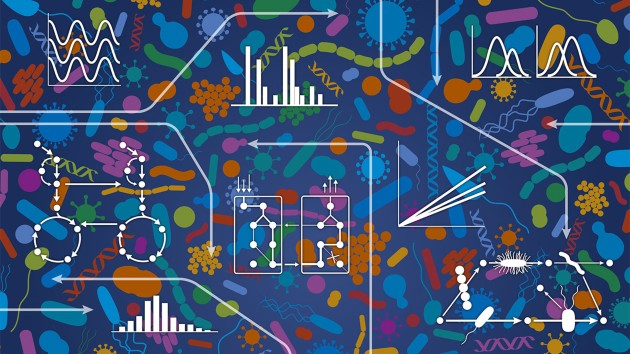Collections
Filters
-
Collection Type
-
-
Focus |
 Microbial biogeochemistry
Microbial biogeochemistry
In this Focus issue on biogeochemistry, Nature Reviews Microbiology highlights the metabolic versatility in microbial communities and the significance of microbial contributions to the flow of elements in Earth’s biogeochemical cycles.
Image: Philip Patenall/Macmillan Publishers Limited -
Focus |
 Bacterial growth
Bacterial growth
In this Focus issue, Nature Reviews Microbiology highlights some of the mechanisms that regulate bacterial population dynamics, and explores how growth depends on environmental conditions, for example in biofilms, the microbiota or states of low energy.
Image: Getty Images/Hemera / Thinkstock \ Kheng ho Toh -
Focus |
Synthetic biology
Since its inception almost 15 years ago, synthetic biology has evolved into a vibrant and productive field, owing in large part to the use of model microorganisms for the design, creation and implementation of both simple and more sophisticated biological systems. This Focus issue of Nature Reviews Microbiologypresents a set of specially commissioned articles that together chart the technological and cultural developments of the field, provide a framework for the use of emerging synthetic devices for microbial engineering, discuss the use of alternative microorganisms for industrial-scale applications and describe the first successful 'real-world' application that has been achieved. The Focus issue is accompanied by a joint Web Special withNature MethodsandNature.
-
Focus |
Plant–microbe interactions
The global population is predicted to reach >9 billion by 2050, putting unprecedented pressure on already scarce natural resources. To tackle the population increase and the associated increased consumption there is an urgent need to increase food production in a sustainable manner. One important pressure on global food security that is often overlooked is that posed by plant pathogens, which cause devastating losses in staple crops including rice and wheat each year. This special Focus issue of Nature Reviews Microbiologyon Plant–Microbe Interactions presents five Reviews from leading experts discussing the latest advances in our understanding of the relationship between bacterial, viral and eukaryotic filamentous pathogens and their plant hosts.
-
Focus |
Next-generation sequencing
High-throughput — or next-generation — sequencing has changed the face of microbiology. The genomic era for bacteriologists began less than 20 years ago, when the Sanger method was used to sequence the first complete bacterial genome sequence. Over the past 8–10 years, the advent of next-generation techniques has dramatically increased the speed and reduced the costs of sequencing, such that it is now possible to sequence a bacterial genome in a few days. This Focus brings together a specially commissioned series of articles that looks at some of the most innovative and interesting applications of next-generation sequencing in microbiology, along with a realistic assessment of the advantages and disadvantages of the different sequencing platforms available.
-
Focus |
Cutting edge issues in immunology and autoimmunity
In recent decades enormous effort has been made to elucidate the pathogenesis of autoimmune and autoinflammatory diseases. Autoimmunity is a multifactorial process in which genetic, immunological, environmental and hormonal factors act in concert, representing what was termed some years ago the “mosaic of autoimmunity”. The May 2011 Special Issue on Cutting Edge Issues in Immunology and Autoimmunity summarizes our current understanding of this complex mosaic. The accompanying selection of recent articles from across the Springer Nature provide further insight into this topic.
-
Focus |
Mucosal Microbiology
Mucosal surfaces are in direct contact with the external environment, making them the first point of contact between a host and an invading pathogen. Furthermore, mucosa are colonized by an array of commensal and beneficial microorganisms, meaning that the mucosal immune system must be able to differentiate between friend and foe. This Focus highlights the latest research providing insights into the composition of our mucosal microbial communities, the host and environmental factors that shape these communities, their interaction with the immune system and the impact of antibiotics on them.
-
Focus |
Antimicrobial resistance
To highlight the problem of resistance to antimicrobials, Nature Reviews Microbiology presents a set of specially commissioned articles that focus on key issues in the field, including the role of antibiotic resistance in nature, how the spread of antimicrobial resistance could be limited and the pharmaceutical strategies that are used to overcome resistance to various classes of antimicrobials. The Focus issue is accompanied by a joint Web Focus with Nature Reviews Drug Discovery.
-
Focus |
Focus on Microbial host cell subversion
Nature Cell BiologyandNature Reviews Microbiologypresent a set of specially commissioned articles that highlight recent progress in our understanding of how microorganisms exploit the cell biology of their host.
-
Focus |
Symbiosis
Microbial symbioses include beneficial, harmful and neutral relationships and are important in animal and plant health, immunity and disease and in ecology and the environment. This special Focus issue highlights exciting advances in our understanding of partnerships between organisms and their environments.
-
Focus |
Sustainability
In the past decade, global climate change has come to the forefront of the political and social agenda owing to the growing realization that the Earth's resources are being used in an unsustainable fashion. To highlight the central role of microbial processes in sustainable development, Nature Reviews MicrobiologyandThe ISME Journalpresent a specially commissioned set of articles that highlight the importance of microorganisms in climatic processes and research the generation of new energy sources.

 Microbiome tractability and translation
Microbiome tractability and translation